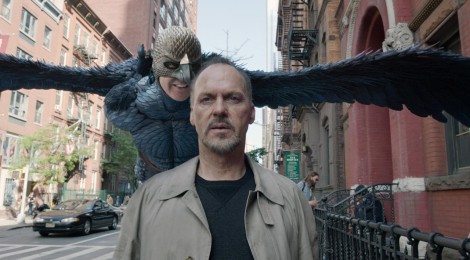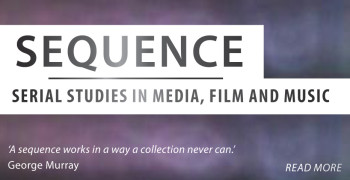
Dolores Tierney on BIRDMAN or (The Unexpected Virtue of Ignorance) (Alejandro González Iñárritu, 2014)
Following this weekend’s Academy Awards ceremony, Mediático co-editor Dolores Tierney assesses one of the biggest winners: Alejandro G. Iñárritu’s Birdman or (The Unexpected Virtue of Ignorance) which won four awards for Best Picture, Cinematography, Original Screenplay and Best Director.
Even prior to its big wins last night at the Oscars’ ceremony, the awards season buzz (flap?) around Alejandro G. Iñárritu’s new film, including this amazing Sesame Street parody (Big Bird [man] anyone?), was tremendous. Birdman seems to be a departure for the director. Iñárritu’s first four features, the death trilogy (Amores perros, 21 Grams, Babel) and then Biutiful were linked together by the exploration of pain, death, and the inequities of neoliberalism in the developing and developed worlds. Indeed I’ve written about three of those films in those terms here. But now, writing the epilogue for my book, I wonder whether Birdman a comedy, set in a New York theatre, seems to rip up my neatly-boxed and auteurist summation of Iñárritu.
The film follows Riggan Thomson (Keaton) a Hollywood actor famous for playing the superhero Birdman in a Hollywood franchise of the same name. With his career in decline, he mounts his own adaptation of the Raymond Carver story What We Talk About When We Talk About Love. The film is set in the decaying St James theatre during the preview week and in the run up to opening night. In between rehearsals and then the previews themselves, in his dressing room Riggan sits and muses about his washed up career and the play which he hopes will give him artistic credibility. Listening to the dark voice of his inner Birdman, he practises telekinetic stunts worthy of his cinematic alter-ego.
Is this film a departure for Iñárritu? Well, Birdman does display a number of features which link it to the director’s other work. It has for instance, Iñárritu’s signature cyclical nature. It opens and closes with a meteor flying to earth (I wondered when I saw the film whether this is supposed to be from the fictional Birdman movies). It also has a subtitle The Unexpected Virtue of Ignorance which, together with some opening quotations by Raymond Carver – give the film the meditative quality of his previous films. Spanish even sneaks in at the margins of the film, when a few words of it are heard at the beginning (these are actually those of the soundtrack composer Antonio Sánchez asking Iñárritu a question). Like all his previous films Birdman has a core creative team of Latin Americans some of whom have worked with Iñárritu before including: Argentinean Screenwriters Armando Bo and Nicolas Giacobone (Biutiful), Mexican cinematographer Emmanuel Lubezki (who hasn’t worked with Iñárritu on a feature before), and Mexican drummer Oscar Sánchez (also a newcomer to the Iñárritu stable). Like 21 Grams and Babel, Birdman is, financially and institutionally, a product of the U.S. independent sector, involving monies from New Regency and major speciality division Fox Searchlight
Also strongly supporting the idea that Birdman represents a continuation for Iñárritu is the film’s most salient formal feature; its seemingly unending single take. A characteristic of all Iñárritu’s previous films, the mobile long take in Birdman is taken to an extreme. The camera follows characters in and out of rooms, up and down the stairs and corridors, on and off the stage and inside and outside the St James theatre on Broadway. Hours and sometimes days pass between scenes and yet the shot never cuts.[1. Birdman of course does have masked edits which take place, like they do in another famous-for-its-single-take-film Rope (Alfred Hitchcock 1946) in moments where the camera focuses on darkness, usually corners.] There’s only one visible cut towards the end of the film when Riggan’s daughter Sam (Emma Stone) looks out of her father’s open hospital window. Cutting from behind to her face we see her look down for her father and then look upwards and smile. The film’s extended long take is more than a stylistic flourish. A cornerstone of André Bazin’s theory of cinema, the long take provides the cinematic credentials for a script that emphasises the importance of authenticity in stagecraft, in cinematography [2. When the computer generated imagery so beloved of contemporary blockbusters does appear in the film towards the end it deliberately clashes with the realist diegesis as it has been established in the film], in the film business, and in the job of simply being oneself.
And, it is on the charge of inauthenticity, that Iñárritu calls to account Hollywood’s superhero franchises (X Men, Avengers, Iron Man, The Hunger Games) and the talented actors (Robert Downey Jnr et al.) who he suggests, let themselves get swallowed up in them. Casting Keaton to play Riggen (who also left a superhero franchise[3. Keaton played Batman in Tim Burton’s Batman 1989 and Batman Returns 1991).]) is another seeming weapon marshalled in the film’s armoury of art cinema authenticity.
And yet despite all these auteurist and art cinema elements, there are aspects in Birdman, in which Iñárritu distances himself from anything as serious as authenticity,[4. Indeed, one of Riggan’s most memorable monologues about the abuse he suffered as a child turns out to be deliberately put on to show Shiner just how method and convincing he can be.] and from what some reviewers call the miserablism of his first four feature films.
Unlike any of Iñárritu’s previous features Birdman is funny, and even hilarious.[4. My favourite line has to be Lesley’s (Naomi Watts) response when asked how she knows Mike Shiner. “We share a vagina” she deadpans.] More precisely, its humour often seems to be about punctuating the art cinema seriousness for which Iñárritu is known. At one point Riggan and method actor Shiner (Norton) carry on an intense conversation as they leave the theatre to walk to a bar. The sequence is accompanied by an edgy drum solo which we presume to be on the excellent and inexplicably not Oscar nominated soundtrack (by Sánchez). However, as Riggan and Shiner walk, a tracking shot reveals the drummer (Sánchez in cameo) is actually playing outside on the street. This reveal punctures the seriousness of the moment and is used another time in similar bathos style inside the theatre itself. The tongue in cheek foolery with the percussive score and other devices (Iñárritu’s cameo – as a lighting man who passes Riggan on the stairs) suggests Birdman makes fun of its own artiness, and of its use of the always self conscious form of art cinema.
Also pointing towards Birdman as a departure is the change in the director’s signature itself. Abbreviating his first surname (González) to the initial G for the first time, Iñárritu emerges as a slightly mainstreamed (or just less ‘other’?) manifestation of his former directorial self . Some might argue that this change in his signature has been accompanied by a similar mainstreaming/taming of his previous films’ critique of Hollywood (aesthetics and first world politics). Indeed, the big wins for Birdman at last night’s Oscars confirm it to be the darling of an industry, which likes nothing more than to see itself simultaneously critiqued and aggrandized hence the number of other meta- Hollywood insider-films to have also won Best Picture (The Artist, Argo) or just won big at the Oscars (The Bad and the Beautiful).







[…] Dolores Tierney on the 2015 Academy Award winning ‘Best Film’ Birdman, directed by Alej… […]